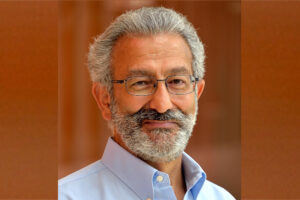
by Amanda Mott
University of Pennsylvania scientist Nader Engheta has been selected as a 2023 recipient of the Benjamin Franklin Medal, one of the world’s oldest science and technology awards. The laureates will be honored on April 27 at a ceremony at the Franklin Institute in Philadelphia.
Engheta, H. Nedwill Ramsey Professor in Electrical and Systems Engineering, is among nine outstanding individuals recognized with Benjamin Franklin Medals this year for their achievements in extraordinary scientific, engineering and business leadership.
“As a scientist and a Philadelphian, I am deeply honored and humbled to receive the Franklin Medal. It is the highest compliment to receive an award whose past recipients include some of my scientific heroes such as Albert Einstein, Nikola Tesla, Alexander Graham Bell, and Max Planck. I am very thankful to the Franklin Institute for bestowing this honor upon me.”
Larry Dubinski, President and CEO of The Franklin Institute, says, “We are proud to continue The Franklin Institute’s longtime legacy of recognizing individuals for their contributions to humanity. These extraordinary advancements in areas of such importance as social equity, sustainability, and safety are significantly moving the needle in the direction of positive change and therefore laying the groundwork for a remarkable future.”
The 2023 Benjamin Franklin Medal in Electrical Engineering goes to Engheta for his transformative innovations in engineering novel materials that interact with electromagnetic waves in unprecedented ways, with broad applications in ultrafast computing and communication technologies.
“Professor Engheta’s pioneering work in metamaterials and nano-optics points the way to new and truly revolutionary computing capabilities in the future,” says University of Pennsylvania President Liz Magill. “Penn inaugurated the age of computers by creating the world’s first programmable digital computer in 1945. Professor Engheta’s work continues this tradition of groundbreaking research and discovery that will transform tomorrow. We are thrilled to see him receive the recognition of the Benjamin Franklin Medal.”
Engheta founded the field of optical nanocircuits (“optical metatronics”), which merges nanoelectronics and nanophotonics. He is also known for establishing and& developing the field of near-zero-index optics and epsilon-near-zero (ENZ) materials with near-zero electric permittivity. Through his work he has opened many new frontiers, including optical computation at the nanoscale and scattering control for cloaking and transparency. His work has far-reaching implications in various branches of electrical engineering, materials science, optics, microwaves, and quantum electrodynamics.
“This award recognizes Dr. Engheta’s trailblazing advances in engineering and physics,” says Vijay Kumar, Nemirovsky Family Dean of Penn Engineering.“ The swift and sustainable technologies his research in metamaterials and metatronics offers the world are the result of a lifelong commitment to scientific curiosity. For over 35 years, Nader Engheta has personified Penn Engineering’s mission of inventing the future.”
Nader Engheta is the H. Nedwill Ramsey Professor in the Departments of Electrical and Systems Engineering and Bioengineering in the School of Engineering and Applied Science and professor of physics and astronomy in the School of Arts & Sciences at the University of Pennsylvania.
This story originally appeared in Penn Today.
